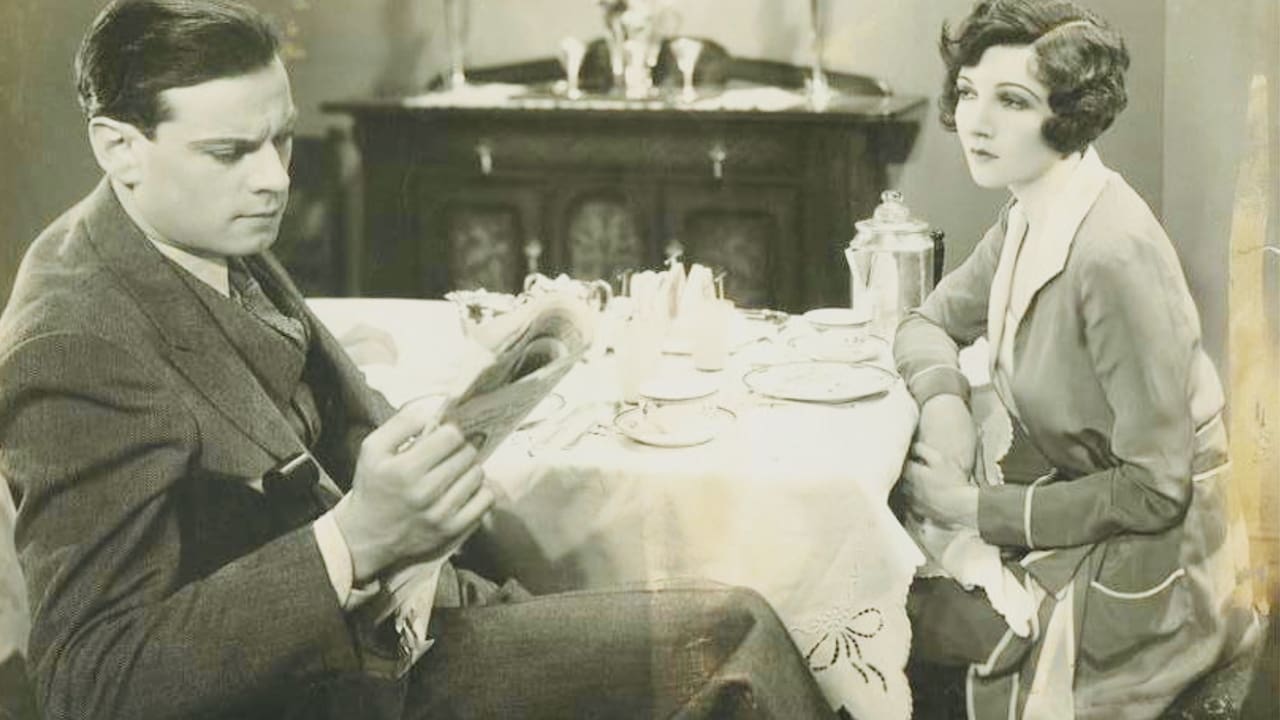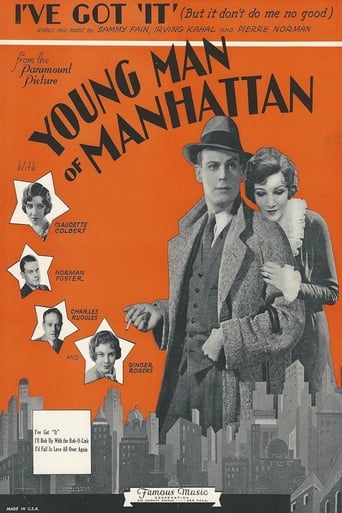

Overrated
... View MoreCharming and brutal
... View MoreAlthough it has its amusing moments, in eneral the plot does not convince.
... View MoreGreat movie. Not sure what people expected but I found it highly entertaining.
... View MoreBig fan of Colbert and enjoy watching her films.This is easily the most forgettable of all the films I have watched.Plenty of her thirties films lack a decent plot or are uneven but usually there are a couple of scenes that are funny or well acted and show off her acting ability - this film had nothing of note.It isn't funny or dramatic and the plot is very unexciting.
... View MoreMade at Paramount's Astoria Studio in New York, whose relatively primitive facilities took advantage of the talents that could be plucked from Broadway during the first few years of sound filming, Young Man of Manhattan gives us a marital drama about two newspaper writers, Norman Foster and Claudette Colbert (real life spouses at the time) during the latter parts of Prohibition. Marrying very quickly after meeting one another following the Tunney-Dempsey boxing match, they appear to take a rather flippant view of their marriage vows with Colbert proposing (discreetly) that they make it something of an 'open marriage', for after all, they're still quite young and what else can you expect?It's an attitude that doesn't survive the first flirtations as jealously rears its ugly head the first time that teenage flapper Puff Randolph (Ginger Rogers) slithers onto the scene and takes dead aim at Foster. Between Puff and her husband's drinking and his general childishness, Colbert soon has had enough. The plot takes a melodramatic turn that lessons somewhat what had been an interesting look into domestic life during the Roaring Twenties.Foster is the main figure and had a nice Pre-Code career before turning to direction, probably not a bad decision on his part as his general whininess prevented him from ever breaking through into real stardom. It served him well in this role, however. Perhaps the main points interest of Young Man of Manhattan today are the early roles provided for Claudette Colbert and Ginger Rogers (indeed, it's Ginger's first feature film, made by her at the age of eighteen). For Claudette it's a straight dramatic part, perhaps not her real strength but adequately accomplished here. Ginger, as well as Charlie Ruggles, serves as comic relief in a Baby Doll role which is right up her alley, and she does quite well with it as well as with a couple of short songs. As others have noted, she uses the Betty Boop style voice that would disappear once she got to Hollywood.The print of the film that I saw was in very poor shape. I wonder if anything better has survived?
... View MoreThis routine seriocomedy flirts with some interesting ideas but doesn't really follow through on them enough to distinguish itself. Colbert and Foster play reporters who marry, then find their careers are a problem--both of them have erratic hours, occasional late nights and out-of-town trips, so each is never there when the other wants them. His character isn't particularly sympathetic by today's standards, because he whines and moans whenever her work takes her away from him, but when the shoe is on the other foot he doesn't grasp the hypocrisy of his complaints one bit. Worse, he takes to drinking too much, isn't grateful when she pays the bills because he can't, and strings along a besotted ninny (Ginger Rogers in her early dark-haired, squeak-voiced phase as a flapper caricature) for idle diversion. Colbert meanwhile is courted by a rich patron/news source, but keeps him at a professional arm's distance.In the early-talkie manner, there's a rather stilted, interior-bound quality to the action, with dead-air sound (actually downright poor sound in the transfer I saw, but that might just have been the fault of a poor dupe) and very little background music. This movie actually could have used a nightclub song or production number or two to liven it up; it's not quite serious enough to be involving as a drama, and not quite diverting enough to be a comedy. (Rogers does sing what might as well be the anthem for characters like hers, "I've Got 'It' But It Don't Do Me No Good," but just by herself at a living-room piano.) There's brief curiosity value in the appearance by "The Four Sherman Sisters," a quartet of pretty (alleged) siblings, but they don't perform, either; they just sling around a few weak quips and get drunk with Foster and his best pal Charles Ruggles (who's had better material, too). There isn't anything very notably "pre-Code" about this feature unless you count the alcohol consumption, whose depiction would soon get cleaned up by the Production Code. Nor does the movie exactly capture much of a Manhattan feel, as there's little exterior footage. Foster plays a sports writer, so there's fleeting interest in (very brief) clips of various sporting events that were presumably shot for newsreels rather than specifically for this feature. The movie's major plus is Colbert, who looks great and treats the goings on with a common- sense unflappability that suggests her heroine is considerably smarter than the callow husband she nonetheless stays loyal to. (Their marital conflicts are predictably resolved by a crisis that drops out of nowhere to re-strengthen their vows.) Co-star Foster would soon leave acting for a long, successful if seldom distinguished career directing mostly B movies and television episodes.
... View MoreGinger Rogers had perfected a "baby talk" act when she was still a teenager as part of her charleston routine in vaudeville. Her mother wrote baby talk monologues for her and fashioned songs to be sung in a cute way - once the management of a theatre held her act over for 32 weeks and both mother and daughter were thrilled. The downside came when she was offered a part in a show, turned it down and watched in annoyance as Helen Kane, her substitute, became a national sensation doing the same sort of "babytalk" that Ginger had perfected. Ginger then had the good luck to be offered a role in "Top Speed" on Broadway and at the same time Paramount offered her the role of dizzy flapper "Puff" Randolph in "Young Man of Manhattan". Too easy, she filmed by day and danced and clowned by night!!!This was quite a familiar theme when the depression took hold - hard working girl taking slothful boy in hand to try to make him achieve what she knows he can!! Reporters Ann Vaughan (Claudette Colbert) and Toby McLean (Norman Foster) meet at the Gene Tunney Championship fight and it is love at first sight for Toby. He has ambitions and thrills Ann with his plans, he wants to get away from sport and become a feature writer. They marry but Ann finds out his ambition is just big talk - he is addicted to good times and the bottle but not to hard work!! She easily passes him on the ladder to success which makes him feel bad and he turns to boozy co-worker Shorty Ross (good old Charlie Ruggles) and the "adenoid infant" "Puff" Randolph, a dizzy school girl. With her insouciance and flip remarks like "Cigarette me, Big Boy" Toby thinks she would be a great subject for a feature article, which he intends to call "Portrait of a Gilded Child" but as usual he dillys and dallys and in the mean time Ann meets "Puff" and what do you think - she thinks "Puff" would make a good study as well!!! Before Ann can put paper in the typewriter she is promoted and whisked out to Hollywood to do a gossip column on the stars (strangely enough Paramount seems to dominate - I wonder why!!!) Toby senses Ann's disappointment in his work habits and with her absence starts to drink heavily and "Puff" who has a huge school girl crush on Toby, zooms in on the kill!!!Surprisingly, in my opinion, the highlight of the movie is when "Puff" sits down at the piano and for no particular reason in the story, does a baby talk version of "I've Got It But It Don't Do Me NO Good" and some fancy scatting to "Good 'N' Plenty". In those few minutes, it's easy to understand how, according to the critics of the day, she easily steals the movie from the main stars. Popular songs ("My Blue Heaven" etc) featured throughout the movie, courtesy of a neighbour's loud radio - this was during the time when studios were trying to incorporate music naturally into the movies without everyone stopping for a song and dance.The story takes a dramatic turn after this when Ann, home on a flying visit, takes a drink of liquor that Toby has left on the table and she is stricken blind. This seems to be just what Toby needs to prove his love - forsaking liquor he manages to write a serialized article and brings home the bacon - in this case $1,000, which manages to pay all the hospital expenses.Never have I seen Norman Foster more relaxed, it was probably because in real life he was married to Claudette Colbert who was, as always, excellent, especially when quipping "You don't know women - especially 16 year olds who think they're Greta Garbo"!!! Norman Foster just didn't seem to have the charisma to be a dynamic leading man, although Paramount certainly gave him enough chances in a diverse number of roles ("No Limit" (1931), "Confessions of a Co-Ed" (1931) etc) so it was a good thing when he took to directing.
... View More